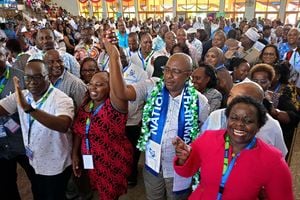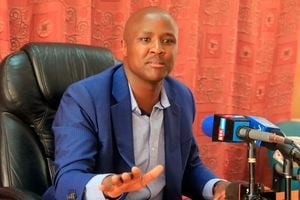Happening now: One-on-one with President William Ruto
473km Nairobi-Mombasa Expressway gets approval

The Treasury says mobilisation of private sector resources for the development of the planned Nairobi-Mombasa Expressway project has started.
The Public-Private-Partnership (PPP) Committee has granted first-stage approval for the planned 473-kilometer Nairobi-Mombasa Expressway, the National Treasury has revealed, paving the way for the progression of the project into the development phase.
The Treasury said the project, targeted to clear heavy congestion and slow speeds between the two cities, is expected to cost about $3.6 billion (Sh555.09 billion).
“Mobilisation of private sector resources to develop and expand key trunk networks in the country, such as the Mombasa-Nairobi Expressway, which is at advanced stages of preparations, having been by been granted first stage approval by the PPP committee recently and therefore ready to progress to the project development phase. Estimated cost is $3.6 billion,” it said.
The multi-billion shilling Nairobi-Mombasa Expressway project had earlier attracted interest by firms including Korean Overseas Infrastructure and Development Corporation (KIND) and American firm Bechtel Executive in partnership with a US Capital Investment Company Everstrong Capital.
The estimated Nairobi-Mombasa Expressway project cost had been set at about Sh300billion in 2018.
Betchel had in 2018 been tapped by the government but the agreement did not progress following a tussle on how the project construction would be financed.
A report published by the Parliamentary Budget Office (PBO) in 2021 indicated that the US firm rejected Kenya’s offer to have it construct the road and recover its costs from charging motorists toll fees.
The PBO, which advises lawmakers on the economy and budget, said Bechtel had settled on a model where the State pays it for building the road instead of recovering its money through user fees.
This will force the government to borrow billions of shillings, jerking public debt whose rapid growth has triggered warnings and throwing the road construction into limbo.
Sources at the Kenya National Highways Authority (KeNHA) said the US firm also demanded a virgin land corridor for the project—a request that the State was uncomfortable with since it would require costly acquisition of land.
“The request for virgin land was contested because KeNHa already has a sufficient reserve on the current road corridor, and it would make sense to buy fresh land for the road project,” a State official said.
In the initial plan, motorists were expected to pay toll charges for using the planned road. The BPO cited a study by the Inter-America Development Bank that showed a road is likely to be a viable candidate for construction through the toll model if it has a flow exceeding 5,000 vehicles per day unless the government offers a substantial subsidy to the contractor.
“This limits the number of roads that can be undertaken by the model in Kenya to a few sections of the main transport corridors. Along the A8 (Malaba – Eldoret – Nakuru – Nairobi – Voi – Mombasa) road, the Nairobi Expressway has so far proved to be a viable section for tolling while the Mombasa – Nairobi Expressway has proved difficult,” PBO said.
“The contractor has indicated that the country will get better value for money if the road is constructed under an EPC (Engineering, Procurement, and Construction) model rather than a toll model,” it added in its 2021 report.
Bechtel argued that the alternative PPP model where the contractor sources for funds would cost five times more at $15 billion (Sh2.23 trillion) and take much longer to complete.





